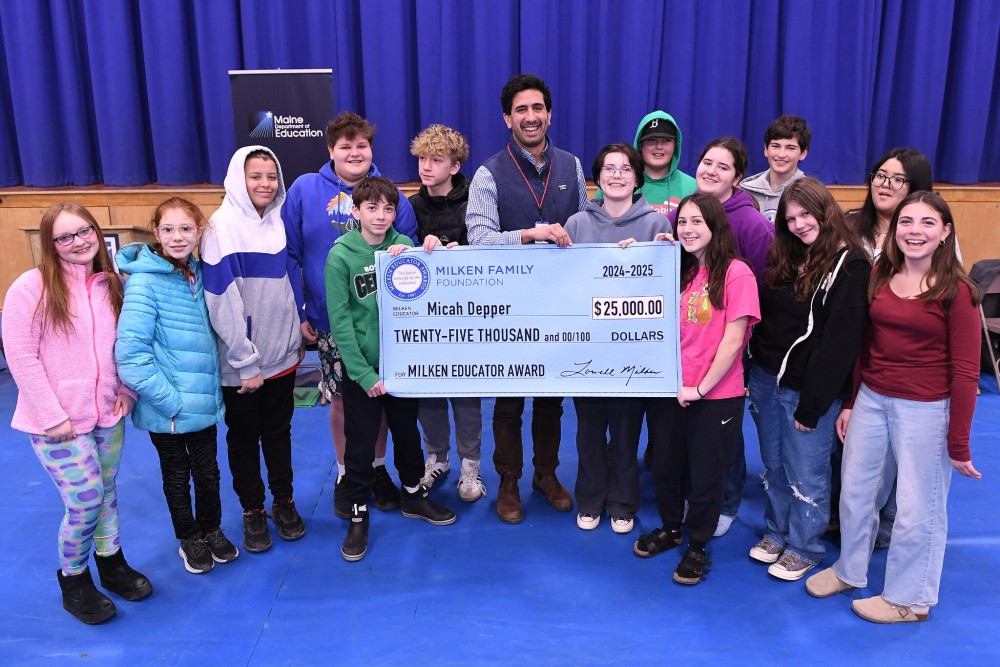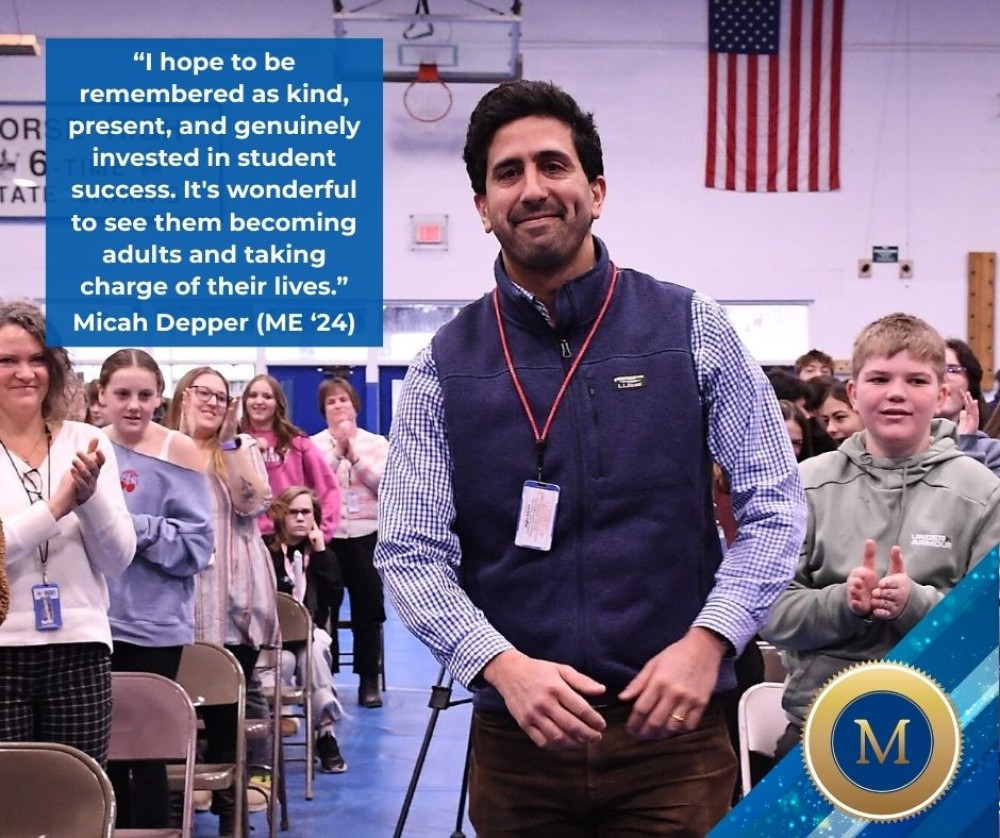Spotlight: Micah Depper (ME '24)
August 21, 2025
Maine Milken Educator Micah Depper (ME ‘24) is a science teacher at Bath Middle School. Depper has always kept learning exciting for students, from inspiring scientific inquiry in the classroom to creating the“BMS Rock Band,” which was an eight week music club that invites students with little to no musical experience to learn how to play an instrument. Depper received a Milken Educator Award on February 5, 2025.
Milken Family Foundation: How did you feel at your Milken Educator Award notification?
The experience was astonishing, to say the least. Once we saw the camera crews in front of the school that morning, the entire community was buzzing with speculation. I hadn't heard of the Milken Family Foundation and was amazed to hear about this organization that seeks out teachers across the country for recognition. When my name was called, I felt disbelief, amazement, and mostly overwhelming gratitude. I work with a tremendously talented and dedicated staff, and I was honored beyond words to stand in front of them and shine a light on the great things we do at Bath Middle School.
MFF: How did students respond to your Milken Award?
I felt like a celebrity for weeks after the award! Students from around the school would high-five me and say congratulations anytime they saw me in the hallway, which felt wonderful.
MFF: What made you want to pursue a career in education?
I got into education by accident. I was on a path towards a career in science research and planned to go to graduate school to pursue a Ph.D. In my senior year, I started volunteering to tutor local high school students, and it became the highlight of my week. I got more involved, then took a leadership position in running the tutoring program and developing science enrichment curriculum. I realized that I absolutely loved working with kids and that my true calling was to teach middle and high school students.
MFF: How do you make complex scientific topics engaging for middle school students through inquiry-based learning?
At the middle school level, many students are learning science for the first time. Students are naturally curious -- they want to catch crabs in the intertidal zone, learn what happens when you mix baking soda and vinegar, and test egg drop contraptions. In my experience, what halts that curiosity is telling kids they have to memorize a bunch of terms and reproduce a known outcome before they get to play. Nobody wants to watch a show if the finale is spoiled! We learn through experimentation. My job is to teach kids how to safely experiment and think logically so that I can unleash them to be scientists. I know I've done my job when everyone is captivated by their project, and I'm merely checking in to probe their thinking and push them farther.
MFF: What inspires you to create programs like the BMS Rock Band and student union, and how do they support students' growth beyond the classroom?
I helped create the school structure that made the Rock Band possible. The Maine Department of Education created the Rethinking Responsive Education Ventures (RREV) program in the aftermath of the pandemic to fund innovative pilot ideas to re-engage students. I coauthored a successful RREV grant, which brought $350K to Bath Middle School and funded a number of initiatives to reinvigorate learning at our school. One of the initiatives I proposed was called "Connections" classes, which are deliberately non-academic classes, designed around teacher or student passions. These occur weekly for all students, with new opportunities each quarter.
Many students love music, but aren't interested in traditional band or chorus. I love playing music, so I proposed a course to teach how to learn rock instruments and collaborate as a band to perform. It was an instant hit, and our work culminated in multiple public performances of music that students chose. This opportunity supported student growth, as the students had to learn to collaborate, give feedback, take turns leading and following, and put in serious effort and revision to produce quality work.
MFF: What does “success” look like for you and your students in life?
To me, success looks like developing the skills and self-awareness to be able to pursue your goals, contribute positively to the world around you, and to grow as a person.
MFF: Who are your role models in teaching?
I have had many wonderful role models over the years. In high school, I was drawn to my physics professor Peter Hawkins. He blended humor, gravitas, and creative problem solving in a way that made class unmissable. At Lewis and Clark College, I had the great fortune to learn from and work in the labs of Paulette Bierzychudek, Greta Binford and Greg Hermann, who are all exceptional educators and scientific thinkers. Right now, my role models are all of my colleagues, whom I learn from each and every day!

MFF: How do you hope to be remembered by your students?
I hope to be remembered as kind, present, and genuinely invested in student success. I live in the same town I teach in and see my students throughout the community as they grow older. It's wonderful to see them becoming adults and taking charge of their lives, and I hope they know I am always glad to see them!
MFF: Are you working on any interesting initiatives or new projects these days? Is there anything else you want to share about your school?
I am very focused on organizing climate change education and improving the sustainability of schools. K-12 schools in the United States use massive amounts of energy and produce vast amounts of carbon emissions and solid waste. I began this work by helping to pass a climate change response policy in my district and chairing a committee that is working to reduce emissions and solid waste from our buildings and operations. I am now consulting statewide with other educators and leaders from the Maine Department of Education and the governor's office to help other schools do the same. I am hopeful that we can make it easier for teachers, students, and community members to organize change in their districts. It's common sense -- the same work that reduces emissions also reduces costs to taxpayers and creates healthier environments for our kids to learn in. We should all be united in this goal!
Don’t miss any new articles and updates from Milken Educator Awards:


